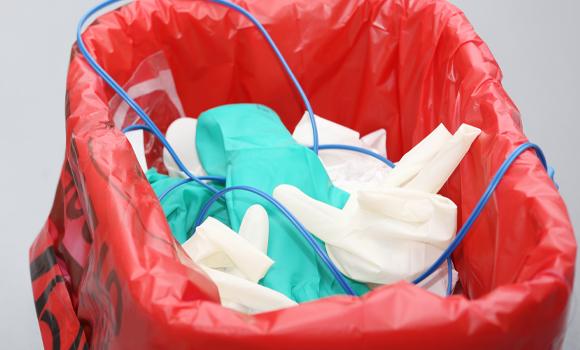Know-how Let Loose: Understanding the Art of Medical Waste Removal for Wellness Facilities
Know-how Let Loose: Understanding the Art of Medical Waste Removal for Wellness Facilities
Blog Article
Eco-Friendly Waste Disposal Solutions for a Lasting Future
In a world where ecological sustainability is paramount, the management of waste has become a crucial concern requiring attention and innovation. Green garbage disposal options are not mere choices yet imperatives for a lasting future. By adopting methods that lessen ecological impact and advertise resource efficiency, neighborhoods and industries can add considerably to a much healthier earth. From waste partition at the resource to energy recovery from waste, a myriad of methods exist to address the difficulties of waste disposal sensibly. The question remains: which remedies hold the most promise for attaining a truly lasting waste monitoring system?

Waste Segregation at Source
When implementing waste partition at resource, people can substantially add to extra reliable recycling and waste monitoring systems. By separating different sorts of waste such as paper, plastic, glass, and organic materials right from the point of disposal, the process of recycling becomes structured, decreasing contamination and enhancing the value of recyclable materials. This technique not just saves sources however additionally reduces the quantity of waste destined for land fills or incineration.
Correct waste segregation at the resource is essential for promoting a circular economic climate where materials are reused, recycled, or composted instead of being disposed of as trash. It likewise assists in the effective collection and handling of recyclables by waste monitoring centers - medical waste disposal. Neighborhoods that adopt waste segregation at the resource usually experience price savings in waste monitoring and see a decrease in environmental contamination
Individuals play a vital role in the success of waste partition initiatives by being mindful of just how they dispose of their waste - click here. Education and awareness projects can further encourage the fostering of these practices, bring about an extra sustainable and environmentally friendly method to squander disposal
Composting and Organic Waste Management
A reliable approach for taking care of organic waste and promoting sustainability is via composting. Composting is a natural process that breaks down organic products like food scraps, backyard waste, and paper into nutrient-rich soil amendments. This procedure not only draws away natural waste from land fills however additionally creates an important item that can enhance soil, enhance plant growth, and decrease the requirement for chemical plant foods.
Applying composting programs at the home, community, and metropolitan degrees can significantly decrease the quantity of natural waste that finishes up in garbage dumps. Educational efforts on composting best practices and the advantages of natural waste diversion can better motivate widespread fostering of this eco-friendly waste management service. click here. Eventually, composting presents a lasting and practical technique to taking care of natural waste while adding to a greener and even more lasting future
Recycling and Upcycling Initiatives
One trick facet of advertising green waste monitoring methods is with the execution of recycling and upcycling campaigns. Furthermore, recycling help in the conservation of raw products and decreases the need for standard waste disposal methods like landfilling and incineration.
Upcycling, on the other hand, is the creative reuse of discarded things or materials to produce items of better or worth than the original. By upcycling, less waste is sent out to land fills, and the need for new resources lowers. This lasting method promotes advancement and urges people to check out waste as a valuable source.
Both recycling and upcycling efforts play a crucial role in promoting a circular economic climate and minimizing the ecological effect of waste disposal. click here. By including these over at this website methods right into day-to-day life, people can contribute to a much more lasting future for generations to find
Power Recovery From Waste

There are numerous technologies utilized for power recovery from waste, including incineration, gasification, and anaerobic food digestion. Incineration entails burning waste at heats to produce vapor, which then drives turbines to create electricity. Gasification converts organic products right into artificial gas, which can be used for power generation or as a fuel source. Anaerobic digestion breaks down organic waste to produce biogas, which can be used for warmth or electrical power production.

Community-Based Waste Decrease Programs
Harnessing area engagement and participation is necessary in executing efficient waste reduction programs that complement power recovery efforts in sustainable waste management methods. Community-based waste decrease programs include collective efforts between citizens, regional organizations, and authorities to decrease waste generation and enhance reusing prices. These programs commonly consist of instructional projects to raise understanding concerning responsible waste disposal techniques, the value of recycling, and the benefits of lowering waste.
One common strategy is the facility of community recycling centers where residents can go down off recyclable materials conveniently. These centers promote reusing by making it easily available and supplying sources for appropriate waste sorting. In addition, area clean-up events and area recycling drives assist impart a feeling of environmental responsibility and unity among residents.
Additionally, community-based waste reduction programs can consist of efforts such as composting workshops, reusable item exchanges, and the promo of lasting techniques in local businesses - medical waste disposal. By including the community in waste decrease initiatives, these programs develop a sense of possession and cumulative responsibility towards building a much more lasting future
Conclusion
In conclusion, executing environmentally friendly garbage disposal services such as waste partition, composting, recycling, power recuperation, and community-based programs is important for a sustainable future. By embracing these practices, we can lower the ecological influence of waste generation and promote a round economic situation. It is imperative that federal governments, services, and people interact to prioritize sustainable waste administration methods to safeguard our planet for future generations.
From waste partition at the source to energy recovery from waste, a wide variety of approaches exist to deal with the obstacles of waste disposal sensibly. Educational efforts on composting best methods and the advantages of natural waste diversion can better encourage extensive adoption of this green waste management remedy.Efficiently taking advantage of energy from waste products is a critical technique in sustainable waste management practices.Utilizing neighborhood interaction and participation is important in applying reliable waste decrease programs that match power recovery campaigns in lasting waste management practices.In conclusion, executing environment-friendly waste disposal options such as waste partition, composting, reusing, energy recovery, and community-based programs is crucial for a sustainable future.
Report this page